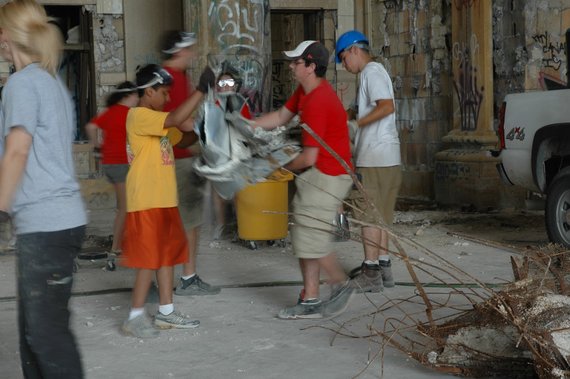Public service needs to be a fundamental aspect of American life. To achieve this, a norm of at least a year of public service should be standardized. It should not be required but highly incentivized, and normalized to such an extent (through education, work and social life) that it becomes highly taboo to opt out. The service should occur during high school, after high school, during college or after college (anytime during emerging adulthood).
There is so much work to do in this country. We cannot allow hyper-obsession with career planning, financial desires or competition to trump service and character development. Ensuring that millions of young Americans are spending time in a new community amidst diversity, engaged in service, would not only enhance society but also the life learning and development of the young adult. Just imagine how radically different our country would be if values such as supporting the elderly, caring for orphans, cleaning streets and assisting the poor was built into the fabric of our society, through a year of service from our nation's youth.
As Jews we have a unique ethical, religious and moral obligation to serve our communities. Rabbi Dr. Irving "Yitz" Greenberg wrote of the centrality of service in Jewish life:
...Personal service must be brought to the fore as a central value of Jewish tradition and culture. Every synagogue, school and organization must teach this norm. Even unaffiliated Jews recognize education and family as synonymous with Jewish values: so should personal service become known as the indispensable expression of Jewishness. ... This is not to say that Gentiles do not practice this value. Personal service to doers is widely recognized and valued in America. However, service must be upheld as a norm expected of Jews. We must teach and work so that personal service is a field pioneered and spearheaded by Jews....
A Jew is commanded not just to do individual acts of chessed (kindness) to others but to set aside regular time for volunteering and giving personal service. What is the minimum number of hours a week, a month or a year that one must dedicate to nurturing the equality and uniqueness of other human beings? We must create a Jewish culture in which the final measurement of "was this life worthwhile" will be: Did one set aside regular times for nurturing other human beings?
However, the history and values that underlie public service are not limited to Jews. Throughout our country's history there have been several American efforts to institutionalize national service. During the post-Civil War Reconstruction period, The Freedmen's Bureau (1865-1872) was established by Congress to facilitate the assimilation of freed slaves into southern society. While frequently lacking in staff, funds and power (southern whites resisted all efforts to help), the Freedmen's Bureau was successful in establishing 3,000 schools, where thousands of northern women volunteered to teach literacy to former slaves. Later, in reflecting on the Civil War and other notables armed conflicts, the American philosopher William James used the phrase "The Moral Equivalent of War" in 1906 to advocate for a future society in which people sacrificed to advance human civilization with the same fervor and self-sacrifice that they willingly expend toward warfare.
In the 20 century, the first national service programs were created in response to the high unemployment rates caused by the Great Depression. The Civilian Conservation Corps (CCC), which lasted from 1933-1942, was the first New Deal program to have a dramatic positive impact. Hundreds of thousands of young, unemployed men predominantly from the east were shipped to the west, where they planted more than 3 billion trees, fought forest fires and built fire towers and roads and worked to reduce soil erosion, all the while earning a modest amount of money that was then immediately pumped back into the economy, thus fueling the national recovery.
President John F. Kennedy further built upon the national service spirit that FDR incited with his New Deal programs. In 1961, President Kennedy's "New Frontier" ushered in a new spirit of national service, with the international Peace Corps and national Volunteers in Service to America (VISTA) being perhaps the most visible programs. Successive Democratic and Republican administrations continued these programs to some degree. Consider the record of the last four administrations (two Republican, two Democrat) and the bipartisan promotion of at least some national service:
· During the Presidency of George H. W. Bush, two bipartisan national service bills were passed: the National and Community Service Act of 1990, which established mostly youth-oriented service programs under the Commission on National and Community Service and the National Civilian Community Corps (NCCC) in 1992, an attempt to create a CCC-type program combined with the use of the military for civilian purposes.
· On September 21, 1993, President Bill Clinton signed the National and Community Service Trust Act of 1993, which incorporated the George H. W. Bush-era programs into the Corporation for National and Community Service (CNCS) and established AmeriCorps. September 2014 will mark its 20 anniversary, during which time 820,000 members have given more than a billion hours of service.
· President George W. Bush created and became chairman of the USA Freedom Corps, which sought to promote national service.
· On April 21, 2009, President Barack Obama signed the Serve America Act, a bipartisan effort by Republican Senator Orrin Hatch of Utah and Democrat Edward Kennedy of Massachusetts (his last major legislative effort before his death). It projected an AmeriCorps membership of 250,000 by 2017.
In spite of these efforts, AmeriCorps membership has not expanded, with only 71,000 enrolled in 2013, far below the levels seen during the second Bush administration. Recently, there have been numerous calls to rejuvenate national service programs. Former General Stanley McChrystal has proposed a year of national service for young adults (ages 18-28) that, while not compulsory, would be "a cultural expectation." The proposed program would only cost $18 billion annually, and could benefit 1 million young Americans by 2023, when a planned public/private partnership would make the program permanent. According to the former general, the program would engender a sense of community and empathy in American society, qualities sorely lacking today.
A number of acclaimed writers and columnists have also advocated for renewed action on national service. Award-winning journalist Jonathan Alter believes that expanding AmeriCorps would have many benefits. For those without a high school education, AmeriCorps service increases the chance of future employment by 50 percent. AmeriCorps expansion would also have great financial benefits; for example, using AmeriCorps members instead of expensive contractors for repairs after natural disasters would save the government millions of dollars. Also, delaying college often makes adults better students, as they have seen something of the outside world and are more likely to apply themselves to a higher degree (anecdotally, many college instructors can confirm that their adult students are often more engaged than those who came straight from high school).
Today, even in spite of a low stipend, more than 7 young Americans apply for each of the current 80,000 AmeriCorps openings, and 9 Americans apply for each of the 6,000 openings at Teach for America. These statistics show that there are thousands and thousands of young Americans who are interested in national service (through AmeriCorps), regardless of their financial reward, but simply do not have the opportunity. We need government leadership on this issue.
Unfortunately, in the current political atmosphere it is hard to envision a bipartisan national service program flourishing. With all this gloomy news, what can be done? We must lobby our elected political officials, regardless of political party, and express our sincere desire for action to be taken on AmeriCorps funding and national service programming. National service has traditionally been a bipartisan concern, and should once again receive the endorsement of everyone in Washington, as it benefits all of society. While lobbying our elected leaders is important we must also take action into our own hands and raise funds for young people in our own communities who want to dedicate themselves to public service.
American Jewish World Service President Ruth Messinger has articulated a beautiful dream:
My vision is of a place and time when service by Jews, in a Jewish context, has become a rite of passage in and for the Jewish community, something that Jews are expected to do. People will be taken outside of themselves to work for social justice in a place or with people who are "the other," in some ways different from themselves, doing this in a Jewish context and, in the process, transforming the participants.
Why? We are at a new point in our lives as American Jews. We enjoy new affluence and security. At the same time, there is immense need in the world. Millions of people are victims of poverty, hunger, disease and oppression. American Jewry will be significantly shaped by our ability to respond not only to Israel and to Jews in need but to all people in need around the world. A new model of Jewish service needs to be articulated that is informed both by Jewish sources and by the radical new challenges of our time.
This great vision is already starting to take hold in our community. There are significant programs in the Jewish community already such as Repair the World and AVODAH and there are many others blossoming. Jews should be at the forefront of modeling and engaging in a year of service.
We must work to make Ruth Messinger's dream a reality, not just in the Jewish community but also throughout our country. We must teach our children the value of serving others and instill that sacred spirit of public service so that it will grow and flourish in the subsequent generations. Let us not be held back by the deadlock in our politics and the failures of our leaders. Let us take our future in our hands and mold it the way we see fit. The time for action is now!
Rabbi Dr. Shmuly Yanklowitz is the Executive Director of the Valley Beit Midrash, the Founder & President of Uri L'Tzedek, the Founder and CEO of The Shamayim V'Aretz Institute and the author of five books on Jewish ethics. Newsweek named Rav Shmuly one of the top 50 rabbis in America."

